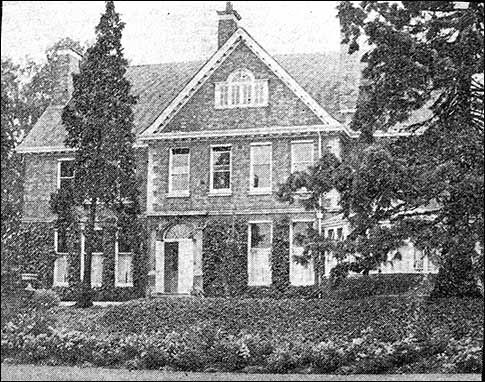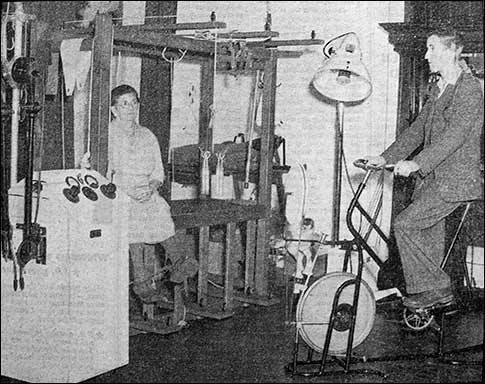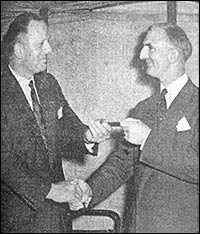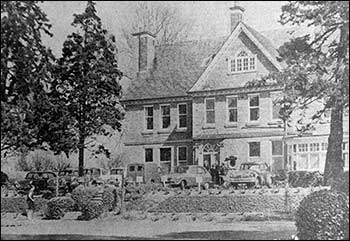Rushden Echo & Argus, 19th October, 1951, transcribed by Jim Hollis
|
 |
 |
|
A large house standing in beautiful grounds, Rushden memorial Hospital was purchased from contributions by inhabitants of the town as a War Memorial. Originally intended as a small cottage hospital, it is now a clinic for out-patients.
|
Patients tone up their leg muscles on two of the pieces of apparatus used for physiotherapy treatment at Rushden Memorial Hospital.
|
Townspeople Raised Funds To Provide Own Hospital - Is now Rushden’s out-patient clinic
To end the story of how Kettering and District Hospital Management Committee is carrying out developments to meet the increasing demands made on hospitals in their area, this week we feature Rushden, where the townspeople themselves have played a big part in the cause of public health.
At the end of World War Two the inhabitants of the town contributed towards the purchase of a beautiful house, standing in spacious grounds, near the centre of Rushden, and helped to provide the necessary equipment.
Rushden Memorial Hospital, as it is called, therefore belongs very much to the ordinary man in the street. Originally intended as a small cottage hospital, it was adapted in 1949-50 as an out-patient clinic. During that year it handled 600 patients, but by last year the figure had jumped to 1,000, which gives a clear idea of how it is being utilised.
At present Rushden Memorial Hospital provides services for general medicine, general surgery, gynaecology, ear, nose and throat treatment, and ophthalmology. Soon its scope will be widened to cover paediatrics (children’s diseases and disorders) and dermatology (study of the skin).
Mention of Rushden conjures up in most people’s minds thoughts of the now famous sanatorium there battling against tuberculosis with an encouraging measure of success.
‘San’ was full
Working in association with Creaton Sanatorium, Rushden “San” provides treatment for patients living in the administrative county of Northampton, and during the last financial year was occupied to capacity.
Accommodation for patients at the sanatorium comprises 80 beds in four bungalow buildings. There is a library of some 2,000 books available for patients and wireless is also installed, and the Friends of Rushden House intend providing patients and resident staff with a television set.
New additions to Rushden Sanatorium are a pair of cottages, built to house Mr. W. A. Wicks, superintendent gardener, who tends the gardens of all hospitals administered by the management committee, and Mr. T. P. Duffy, stoker.
Just as they provided Rushden with the Memorial Hospital so the public, through the Tuberculosis Care Committee, does valuable work for the welfare of patients discharged from the sanatorium, and through the Friends of Rushden House provide in-patients with extras and amenities.
|
July 2020: Work started, following plans being passed, to convert the building into
14 flats, with car parking on what was the front garden.
The Rushden Echo and Argus, 16th March, 1951, transcribed by Gill Hollis
Hospital praised by Council chairman
High praise of the work at Rushden Memorial Hospital was given by Coun. F. E. Brown (chairman) in a special statement to Rushden Urban Council on Wednesday.
“I should like to draw the Council’s attention to the progress being made at the Rushden Memorial Hospital,” said Mr. Brown. “At the invitation of the Chairman of the Board of Governors I had the opportunity of paying an informal visit there last week to see it working.
“It is doing a great service for the townspeople of Rushden and its environs. Radio therapy treatment is being given, as you know, but what is more pleasing is that specialists from Northampton and Kettering General Hospitals are making regular attendances for consultations.
“Twelve of these gentlemen, covering a wide field of medical science, attend bi-weekly, and patients are saved time and expense in being able to attend at the Hayway instead of having to journey to Northampton.
“It may interest members to know that during February 737 treatments were given and 214 out-patients attended for consultation.
“I mention this because I feel that the Council should be informed of the work that is being done by a very competent staff whom I would congratulate on the way their duties are carried out. In the near future they hope to have still better arrangements for the timing of appointments resulting in the minimum of delay.
“Those who worked and fought so hard for the retention of this Memorial Hospital must feel that their efforts have brought the reward they deserved.”
|
The Rushden Echo and Argus, 14th June 1957, transcribed by Jim Hollis
Hospital will be improved
Funds raised at Rushden several years ago will cover most of the cost of improvements now to be made at the town’s War Memorial Hospital.
Estimated to cost £6,500, the work has been ordered by the Kettering District Hospital Management Committee. It arises from the increasing use of the hospital as shown by the fact that physiotherapy treatments alone increased from 10,000 in 1953 to 18,000 last year.
This department will remain on the ground floor, but its accommodation will be rearranged. The first floor will be used as a consultative out-patient department, and the top floor, at present unused, will accommodate the ophthalmic, ear, nose and throat, and paediatric clinics.
Heating System
With the top floor in use, the old heating arrangements become inadequate, and a completely new oil-fired heating system is to be installed.
A lift serving all floors is an important new feature, and the work also includes the adaptation, re-decoration and equipping of rooms.
Mr. B. W. Bell, secretary, said that the Kettering committee deeply appreciated the generosity always shown by the Rushden Memorial Hospital Committee.
|
Rushden Echo & Argus, 13th June, 1958, transcribed by Gill Hollis
 |
| A tablet recording Rushden's final gift of £4,500 to the War Memorial Hospital in Hayway is handed by Mr. George Marriott, representing the subscribers, to Mr. Arthur Colton, chairman of the house committee. |
|
Proud step by Memorial Hospital
Fourteen hundred people from a district which includes Higham Ferrers, Irthlingborough and Raunds visit Rushden Memorial Hospital every month, and each arrival costs the authorities eleven shillings.
Mr. Arthur Colton, chairman of the House Committee, gave these figures on Saturday when a lift and other new features at the hospital were officially opened.
The lift, redistribution of departments, new heating apparatus and redecoration of two floors have cost about £8,000, toward which the final balance of £4,500 from funds raised in Rushden several years ago has been applied.
Modern style
With the second floor now developed the whole of the Hayway building is now in use. The redecoration is in a modern-style mixture of colours chosen by Sister Lane, the head of the staff.
Saturday’s ceremony, at which 150 people from the town and district were guests of the House Committee, opened in a marquee, where Mr. G. W. Marriott, representing the local donors, presented Mr. Colton with a plaque recording Rushden’s gift. The tablet will be placed near the lift.
The company stood in memory of the 138 Rushden people whom the hospital commemorates.
Recollections
Mr. Colton recalled the hospital opening within six months of the decision to nationalise the health service. He mentioned that Mr. H. R. Patenall, first chairman of the House Committee which works under the Kettering and District Hospital Management Committee, was recuperating at Sidmouth after a period of ill-health.
Mr. Marriott spoke of the money subscribed by thousands of people who wanted a local hospital. When nationalisation came in, he said, they expected another dose of bureaucracy, but did not realise that the hospital would be controlled by local people.
Most of the promoting committee’s aspirations had been accomplished, and some of the best medical and surgical brains in the country had been serving the people of the district. The launching of the hospital had been one of Rushden’s finest efforts.
Mrs. Alice Muxlow described the hospital as “a beautiful and magnificent memorial” and declared that as an out-patient clinic it was far more useful than a hospital containing a few beds could have been.
Dr. Gerald Gibbons, vice-chairman of the Kettering and District Hospital Management Committee, thanked the Rushden public and added that the voluntary spirit had by no means been submerged by the Welfare State. “I feel,” he added, “that these outside clinics are a great boon to the local people.”
Mrs. Muxlow afterwards led the way into the hospital and declared the lift open. The guests inspected the hospital, and in the early evening many of the general public followed their example.
|
|
|
The Rushden Echo and Argus, 24th April 1959, transcribed by Jim Hollis
Thefts at local hospital
The theft of fruit and flowers from the grounds of Rushden Memorial Hospital is causing deep concern, and the Kettering and District Hospital Management Committee is asking for the co-operation of the public in putting a stop to the present situation.
Apart from stealing, there have been frequent cases of damage, often wilful, to trees, hedges and flower beds.
In spite of all attempts to prevent it, stealing is still going on, management committee says – mainly because the hospital is a peripheral out-patient department and there is no-one on the premises after six o’clock at night or after noon on Saturday.
Help Sought
The police are aware of the difficulties experienced in this connection, and the management committee has not agreed to the erection of two notices warning the public that “trespassers will be prosecuted” – because the fact that it is Government property complicates the situation.
The “Echo and Argus” was told by the committee: “We would ask for the co-operation of the general public in informing the police if they see anybody in the grounds of this hospital who has no authority to be there.”
The wide entrances to the two drives leading to the hospital building are un-gated, but the thieves and damage-doers are believed nearly always to get into the grounds over the side fence from the adjoining field.
Barbed Wire
Barbed wire has been fixed on the fences and on the locked gates of the fruit field behind the building, but still the trouble-makers manages to get through. Hedges have several times been found damaged to make a gap allowing a way in.
If there were no outside interference there would normally be a 15 cwt. crop of apples and pears which would go to Rushden House Sanatorium and to other local hospitals. Usually most of the trees are stripped.
Frequent Cases
The gardener, Mr. Jack Minney, said that for the 14 years he has been working at the hospital there have been frequent cases of theft and damage – something he would never even have thought could happen when he worked for Lord Northampton at Castle Ashby.
“Sometimes shrubs have been dug up and taken away, and I have lost whole rows of delphiniums and sweet Williams,” he said. “A lot of damage is caused by young children, but I am sure the main stealing has been by older people.”
Systematic
Sister F. M. Lane said that the apples were stolen at the time of the year when prices were high in the shops, and the stripping of trees was done very systematically, showing that it was unlikely to be children who are responsible.
It was a great shame that such mean conduct was to be experienced, and she hoped that people of the neighbourhood and passers-by would tell the police if they saw any unauthorised persons in the grounds outside normal hours.
|
|
The Rushden Echo, 26th April 1968, transcribed by Jim Hollis
Hospital Closing Story Denied
 |
|
1968
|
A strong rumour which has been circulating in the Rushden area that the Memorial Hospital in the Hayway is to close down has been categorically denied by the Oxford Regional Hospital Board.
The rumour started at the beginning of the week and by Wednesday was being spoken of as fact. Various people telephoned the “Echo” office to ask if it was true. And we understand even Mr. Harry Howarth, Labour MP for the Wellingborough constituency, has been contacted.
The “Rushden Echo” put the rumour to a spokesman for the Regional Board and he said: “The Board has no immediate plans to alter the facilities at present provided at the Memorial Hospital. The Rushden hospital is not even included in any long term plans that the Board has listed.”
He added: “The Board is continuously reviewing hospital facilities which are provided within its area but at the moment no change is envisaged for Rushden.
“Any changes of this kind are always considered by the Board in full consultation with the Local Management Committee, doctors and various interested bodies in the town.”
Mr. G. W. Marriott, vice-chairman of the Rushden Hospital Health Committee, had also heard the rumour – five minutes before the “Echo” telephoned him for a comment.
He said he had not heard of any plans to close the hospital. It was certainly no intention of the Hospital Management Committee to discontinue the facilities provided at the Memorial Hospital, he added.
The hospital itself was bought by public subscription for £16,000 and was opened as a physiotherapy unit.
Later it was run under the auspices of the Oxford Regional Hospital Board as a clinic where patients are still able to meet consultants. It is also used for physiotherapy and maternity clinics.
Divisional Conservative agent, Mr. Arthur Ballard, told the “Echo” that he also had heard the rumours and said that many people would be “very concerned if it were so.”
|
|